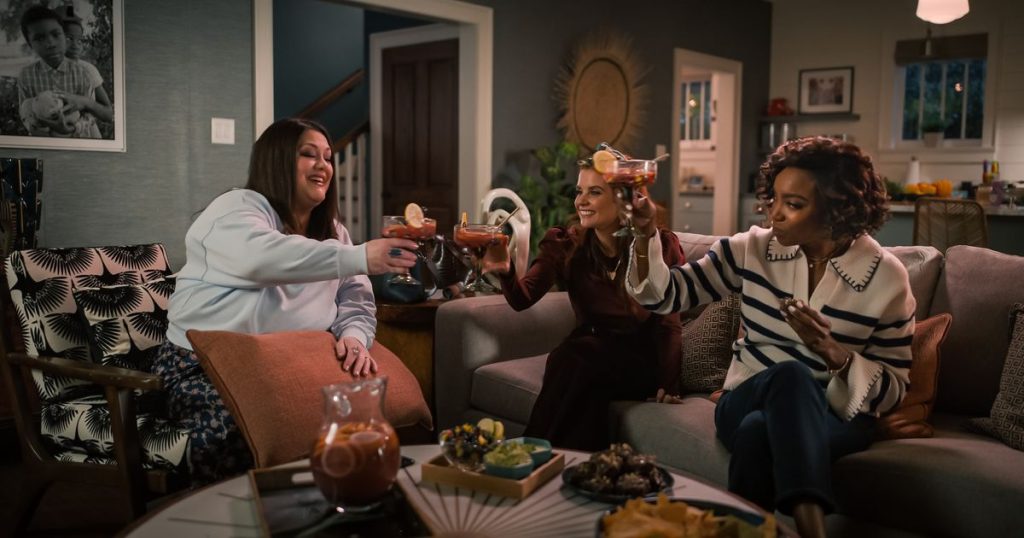Finding Comfort in the Familiar: The Enduring Appeal of Sweet Magnolias
When Sweet Magnolias first premiered on Netflix in May 2020, the world was in the grips of the COVID-19 pandemic. Social distancing, Zoom calls, and the overwhelming loneliness of isolation had become the new normal. For many, including myself, the show became an unexpected lifeline—a way to escape the chaos of reality and find solace in the familiar rhythms of small-town life, heartfelt friendships, and the comfort of margarita nights. The series, based on Sherryl Woods’ novels, follows the lives of three best friends—Maddie, Helen, and Dana Sue—in the charming South Carolina town of Serenity. For me, the show debuted during one of the most difficult times of my life: I was grieving the loss of my mom to cancer, juggling the demands of caring for two young children, and longing for a sense of normalcy and connection. The show’s gentle, if sometimes cheesy, storytelling became a balm for my weary soul.
The first two seasons of Sweet Magnolias were everything I needed them to be. Maddie, Helen, and Dana Sue’s weekly margarita nights, their romantic misadventures, and their unwavering support for one another felt like a warm hug. The show’s portrayal of small-town Southern life, complete with its saccharine dialogue and stereotypical Southern charm, was far from perfect, but it was precisely the kind of escapism I craved. The third season, however, marked a turning point for me. The once-gentle soap opera devolved into an emotionally overwrought, meandering mess. The stakes were impossibly low, the dialogue often cringe-worthy, and the Southern caricatures so exaggerated that I nearly stopped watching altogether. By the time the third season ended, I wasn’t sure if I’d return for a fourth.
A Package of Feelings, Familiar and Comforting
It turns out, I couldn’t resist the pull of Sweet Magnolias’ fourth season. The trailer, with its familiar sight of Maddie, Helen, and Dana Sue clinking their salt-rimmed glasses, was enough to draw me back in. There’s something undeniably comforting about returning to Serenity, even if the show’s writing remains as sentimental and emotionally heavy-handed as ever. The fourth season opens with a time jump, and it takes a moment to acclimate to the new status quo. Maddie and her baseball-playing beau are now engaged, and she’s published a children’s book inspired by her late mother. Helen, still reeling from her breakup with the insufferable Ryan, is navigating a new romance while working under the newly elected Mayor Peggy and pining for the ever-charming Chef Erik. Dana Sue, meanwhile, has shifted her focus to the community foundation she established with the inheritance from the late Frances Wingate, stepping back from her restaurant to give back to her town.
The season also introduces a new trio of younger characters—the so-called “Mini Magnolias,” consisting of Dana Sue’s daughter Annie and her two new friends, CeCe and Lily. Together, they embark on their own adventures, forming a bond reminiscent of the one shared by their mothers. The season’s structure, centered around the holidays from Halloween to Christmas, provides a much-needed sense of direction, helping the show regain its footing after the lackluster third season. As the residents of Serenity face personal and natural disasters, including a financial crisis brought on by the town’s previous corrupt mayor, the show reminds us of the power of community, grace, and the importance of showing up for one another—even when things feel hopeless.
The Power of Community in Hard Times
One of the most enduring themes of Sweet Magnolias is the idea that even in the darkest moments, connection and kindness matter. This season is no exception. As the town works to recover from the financial fallout and navigate their individual struggles, the people of Serenity embody their hallmark grace and hospitality. Whether it’s organizing festivals to boost morale, rallying around neighbors in need, or simply offering a listening ear over a margarita (or two), the show reminds us that even small acts of kindness can make a big difference. And while the dialogue often veers into overly sentimental territory—practically every conversation feels like a heartfelt monologue—the core message of the show feels more relevant now than ever.
For me, watching this season of Sweet Magnolias has been a balm for my own anxieties about the world. Life in 2023 feels overwhelming, with the “quad-emic” of winter illnesses, rising costs, and the relentless divisiveness of politics. It’s hard to feel hopeful when the world seems so broken. Yet, Sweet Magnolias offers a much-needed reminder that even in the midst of struggle, there is value in coming together, in “pouring it out” with the people we love, and in choosing to believe in the possibility of better days ahead. As Maddie, now serving as the town’s spokesperson, so eloquently puts it, the challenges Serenity has faced have only strengthened its residents’ resolve to support one another. It’s a quaint sentiment, perhaps, but it’s one I desperately needed to hear.
Embracing Hope and Kindness in a Broken World
In a world that often feels anything but kind or gentle, Sweet Magnolias is the television equivalent of a warm blanket—imperfect, perhaps, but undeniably comforting. While the show’s portrayal of the South can feel caricatured, and its dialogue often tips into the realm of the absurd, its heart is in the right place. At its core, Sweet Magnolias is a show about the transformative power of friendship, the resilience of community, and the enduring importance of hope. It’s a show that believes in the goodness of people, even when they falter, and that reminds us that grace—even when it feels forced or overly sentimental—is something worth striving for.
For me, this fourth season of Sweet Magnolias has been a timely reminder of the beauty of simplicity. In a world that often feels too complicated, too messy, and too broken, there’s something to be said for a show that unapologetically celebrates the little things: a good friend, a strong drink, and the quiet acts of kindness that keep us going. It’s not perfect, but then again, perfect isn’t always what we need. Sometimes, all we need is a little hope, a little heart, and the reassurance that even in the darkest times, there’s still something worth toasting to.















